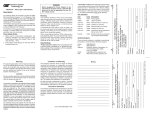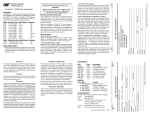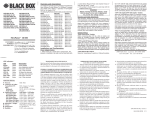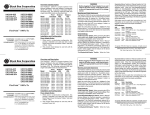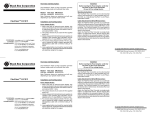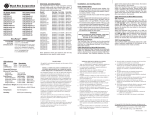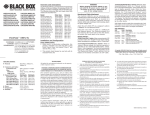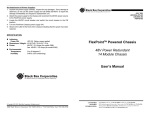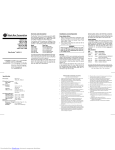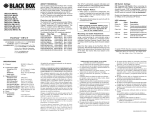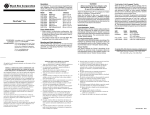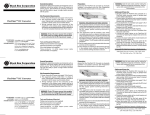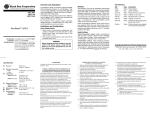Download Black Box T1/E1 User's Manual
Transcript
Description: US Power Supply International Power Supply MT660A-MM MT661A-SM MT662A-MSC MT663A-SSC MT664A-SSC MT660A-MM-E MT661A-SM-E MT662AE-MSC MT663AE-SSC MT664AE-SSC FlexPoint™ T1/E1 Copper to Fiber Line Driver CUSTOMER Order toll-free in the U.S.: Call 877-877-BBOX SUPPORT (outside U.S. call 724-746-5500) INFORMATION FREE technical support 24 hours a day, 7 days a week; Call 724-746-5500 or fax 724-746-0746 Mailing address: Black Box Corporation, 1000 Park Drive, Lawrence, PA 15055-1018 Web site: www.blackbox.com E-mail: [email protected] The FlexPoint T1/E1 connects T1 and E1 devices, such as PBXs, CSUs and routers, via multimode (MM) or single-mode (SM) fiber. Designed to extend the standard T1/E1 twisted pair or Coax network distances over fiber, this converter provides protection from environmental noise and effectively increases high-speed network reliability. The following models are described here. Model # MT660A-MM MT661A-SM MT662A-MSC MT663A-SSC MT664A-SSC MT660A-MM-E MT661A-SM-E MT662AE-MSC MT663AE-SSC MT664AE-SSC Fiber Type MM, ST, 1300nm SM, ST, 1300nm MM, SC, 1300nm SM, SC, 1300nm SM, SC, 1300nm MM, ST, 1300nm SM, ST, 1300nm MM, SC, 1300nm SM, SC, 1300nm SM, SC, 1300nm Max Distance 5km / 3.1mi 28km / 16.8mi 5km / 3.1mi 28km / 16.8mi 58km / 36 mi 5km / 3.1mi 28km / 16.8mi 5km / 3.1mi 28km / 16.8mi 58km / 36 mi Power Adapter Notice 1. When Using in a stand-alone configuration, this product is intended to be and must be used only with a Listed Direct Plug-In Power Unit marked “Class 2” and rated at 9VDC, 1 Amp. 2. This product should always be used only with the supplied power unit . 3. Models shipped with international power supplies are capable of auto switching from 100-230V, and are supplied with a U.S. type NEMA 5-15 power cable. 4. For products being shipped outside of the U.S., the user is required to install a properly grounded IEC Page 1 Page 2 Local loop-back and Remote loop-back Operational rating on relay pins 3 & 6: 0-220VDC max 2A When both Local and Remote Loop-back are set to the Normal position, the FlexPoint T1/E1 uses the default B8ZS data format. When both switches are turned to their On position, it uses the AMI data format. LED Indicators Transmit/force 1’s to fiber This switch is used to insert an “all ones” pattern into the data stream being transmitted out of the fiber port on the FlexPoint T1/E1 converter. Data being received on the coax or twisted pair will be disabled and data being received on the fiber is passed through to the coax or twisted pair side. By returning the switch to the normal position the unit will resume to normal operation. LED Color Power: Yellow Fiber: Green UTP/Coax: Green Transmit/force 1’s to Coax or UTP This switch is used to insert an “all ones” pattern into the data stream being transmitted out of the coax or twisted pair on the FlexPoint T1/E1 converter. Data being received on the fiber will be disabled and data being received on the coax or twisted pair is passed through to the fiber side. By returning the switch to the normal position the unit will resume to normal operation. Alarm Relay Contacts The FlexPoint T1/E1 converter also features dry relay contacts for optionally connecting the media converter into a separate T1/E1 alarm circuit. The relay closes when a loss of power or when signal detect is lost to the copper or fiber connection. Relay RJ-45/RJ-48 3 6 Yellow WARNING! Before inserting the Power Adapter, verify that the power on the unit is appropriate for your AC line voltage source. Attach the BNC to the FlexPoint T1/E1 converter and attach the other end of the BNC to the network equipment. Note: Use copper cables that are compliant with the specifications that are outlined in copper cable specifications. Mounting instructions: The FlexPoint Fiber Converter can be solo-mounted using a wall-mounting kit, or rack-mounted using a 5-unit shelf, or a high-density FlexPoint 14-Unit Power-Redundant Chassis. Fiber Optic Cable Attachment: Connect the fiber cables between the FlexPoint T1/E1 converters. The transmit (Tx) must attach to the receive side and the receive (Rx) must attach to the transmit side. Note: Use fiber cables that are compliant with the specifications that are outlined in fiber cable specifications. Copper Cable Attachment: RJ-45/RJ-48 T1/E1 connector Connect to the RJ-45/48 connector on the FlexPoint T1/ E1 converter via a category 3 or better cable (Category 5 is recomended) and attach the other end to the network equipment. (The twisted pair connection requires two active pairs in a T1/E1 environment. The active pairs are pins 1&2 and pins 4&5. Only dedicated wire pairs should be used for the active pins.) Set the UTP DCE / DTE switch for the RJ-45/48 port to the appropriate setting. Page 3 Wavelength: Max Distance: 1300nm 58km / 36mi Description Copper Cable Specifications: Twisted-Pair cable for T1 On Power applied Off On Blink No signal detect Signal detect All ones received Gauge Impedance Impedance characteristic Maximum distance Off On Blink No signal detect Signal detect All ones received Off On Blink Fast Blink Normal operation L/LB or All 1’s Test mode R+L/LB Received master R+L/LB Received slave 22 to 24 AWG 100 Ω + 10% 2.6 dB / 100m @ 1.0 MHz 6,000 ft Twisted-Pair cable for E1 Fiber Cable Specifications: Multimode Gauge Impedance Impedance characteristic Maximum distance 22 to 24 AWG 120 Ω + 10% 2.6 dB / 100m @ 1.0 MHz 8,000 ft Coax cable for E1 Gauge Impedance Impedance characteristic Maximum distance 22 to 24 AWG 75 Ω + 10% 2 dB / 100m @ 1.0 MHz 8,000 ft 50/125, 62.5/125, 100/140 μm 1300nm 5km / 3.1mi Cable: Wavelength: Max Distance: Single-mode long-haul 9/125 μm Page 8 The UTP DCE/DTE switch is used to eliminate the need for crossover and custom cables to connect devices together when using the RJ-45/48 port. Set this switch to DCE to use a straight-through cable and to DTE when a crossover-cable would be required. DCE DTE Line Type Port Type Distances Switch Positions 1 2 3 4 T1 DSX-1 T1 DSX-1 T1 DSX-1 T1 DSX-1 T1 DSX-1 RJ-45/48 RJ-45/48 RJ-45/48 RJ-45/48 RJ-45/48 0’ - 133’ 133’ - 266’ 266’ - 399’ 399’ - 533’ 533’ - 655’ B B B B B B B B B A B B A A B B A B A B T1 DS-1 T1 DS-1 T1 DS-1 T1 DS-1 RJ-45/48 RJ-45/48 RJ-45/48 RJ-45/48 0 dB -7.5 dB -15.0 dB -22.5 dB B B B B B A A A B B A A B A B A E1 75 Ω E1 120 Ω E1 75 Ω E1 120 Ω Coax/BNC RJ-45/48 Coax/BNC RJ-45/48 Standard Standard Extended Extended A A A A B B B B B B A A B A B A Operational switch settings and functions Twisted 1 RTIP Pair #1 2 RRING TTIP TRING Twisted 1 RTIP Pair #1 2 RRING TTIP TRING Twisted 4 TTIP Pair #2 5 TRING RTIP RRING Twisted 4 TTIP Pair #2 5 TRING RTIP RRING The following operational switches located on the front of the FlexPoint T1/E1 converter are to assist in installation and fault isolation. Local Dual Loop Back Remote & Local Loop Back Force 1’s to Fiber Force 1’s Copper T1/E1 Copper line configuration settings The T1/E1 copper line codes and line lengths are configured using dip switches located on the side of the FlexPoint T1/E1 media converter. Normal Local loop-back (L/LB) This switch will set the FlexPoint T1/E1 converter in a loop-back mode on both the fiber and copper connections. By returning the switch to the normal position the unit will resume to normal operation. Cu-Rx FO-Tx Cu-Tx FO-Rx Loopback Enabled Remote loop-back (R+L/LB) This switch will allow the entire fiber segment to be tested at either of the FlexPoint T1/E1 converters without having to set switches on both units. When set in this mode of operation the local unit is switched in a local loop-back mode. And in addition to the local loop-back mode of operation the fiber Tx port will be further encoded to carry a remote loop-back protocol. This remote loop-back protocol will set the far end FlexPoint T1/E1 converter to remote loop-back mode of operation and return a signal to the sending unit. An LED on the local and remote FlexPoint T1/E1 converters will show a confirmation that the fiber segment is communicating properly between devices. By returning the switch to the normal position it will resume to normal operation. Cu-Rx Cu-Tx FO-Tx FO-Rx Cu-Tx FO-Rx FO-Tx Cu-Rx Remote Loop Request Over Fiber Page 5 Page 4 TRADEMARKS All applied-for and registered trademarks are the property of their respective owners. FEDERAL COMMUNICATIONS COMMISSION AND CANADIAN DEPARTMENT OF COMMUNICATIONS RADIO FREQUENCY INTERFERENCE STATEMENTS 1. 2. 3. This equipment generates, uses, and can radiate radio frequency energy and if not installed and used properly, that is, in strict accordance with the manufacturer’s instructions, may cause interference to radio communication. It has been tested and found to comply with the limits for a Class A computing device in accordance with the specifications in subpart J of Part 15 of FCC rules, which are designed to provide reasonable protection against such interference when the equipment is operated in a commercial environment. Operation of this equipment in a residential area is likely to be cause interference, in which case the user at his own expense will be required to take whatever measures may be necessary to correct the interference. 4. 5. Changes or modifications not expressly approved by the party responsible for compliance could void the user’s authority to operate the equipment. 9. Le présent appareil numérique n’émet pas de bruits radioélectriques dépassant les limites applicables aux appareils numéirques de las classe A prescrites dans le Règlement sur le brouillage radioélectrique publié par le ministère des Communications du Canada. 9/125 μm 1300nm 28km / 16.8mi Cable: Wavelength: Max Distance: Switch Settings: UTP DCE/DTE setting This digital apparatus does not exceed the Class A limits for radio noise emission from digital apparatus set out in the Radio Interference Regulation of the Canadian Department of Communications. Single-mode Cable: Page 7 Coax E1 Connector Status Test: Note: Use copper cables that are compliant with the specifications that are outlined in copper cable specifications. 320 appliance cable with a minimum rating of 10 AMPs. 5. User-supplied cables must meet the required safety agency approvals, applicable international standards and electrical ratings for the region. 6. 7. 8. 10. 11. NORMAS OFICIALES MEXICANAS (NOM) ELECTRICAL SAFETY STATEMENT Todas las instrucciones de seguridad y operación deberán ser leídas antes de que el aparato eléctrico sea operado. Las instrucciones de seguridad y operación deberán ser guardadas para referencia futura. Todas las advertencias en el aparato eléctrico y en sus instrucciones de operación deben ser respetadas. Todas las instrucciones de operación y uso deben ser seguidas. El aparato eléctrico no deberá ser usado cerca del agua—por ejemplo, cerca de la tina de baño, lavabo, sótano mojado o cerca de una alberca, etc. El aparato eléctrico debe ser usado únicamente con carritos o pedelstales que sean recomendados por el fabricante. El aparato eléctrico debe ser montado a la pared o al techo sólo como sea recomendado por el fabricante. Servicio—El usuario no debe intentar dar servicio al equipo eléctrico más allá a lo descrito en las instrucciones de operación. Todo otro servicio deberá ser referido a personal de servicio calificado. El aparato eléctrico debe ser situado de tal manera que su posición no interfiera su uso. La colocación del aparato eléctrico sobre una cama, sofá, alfombra or superficie similar puede bloquea la ventilación, no se debe colocar en libreros o gabinetes que impidan el flujo de aire por los orificios de ventilación. El equipo eléctrico deber ser situado fuera del alcance de fuentes de calor como radiadores, registros de calor, estufas u ostros aparatos (incluyendo amplificadores) que producen calor. El aparato eléctrico deberá ser connectado a una fuente de poder sólo del tipo descrito en el instructivo de operación, o como se indique en el aparato. Page 6 12. Precación debe ser tomada de tal manera que la tierra fisica y la polarización del equipo no sea eliminada. 13. Los cables de la fuente de poder deben ser guiados de tal manera que no sean pisados ni pellizcados por objetos colocados sobre o contra ellos, poniendo particular atención a los contactos y receptáculos donde salen del aparato. 14. El equipo eléctrico debe ser limpiado únicamente de acuerdo a las recomendaciones del fabricante. 15. En caso de existir, una antena externa deberá ser localizada lejos de las lineas de energia. 16. El cable de corriente deberá ser desconectado del cuando el equipo no sea usado por un largo periodo de tiempo. 17. Cuidado debe ser tomado de tal manera que objectos liquidos no sean derramados sobre la cubierta u orificios de ventilación. 18. Servicio por personal calificado deberá ser provisto cuando: A: El cable de poder o el contacto ha sido dañado; u B: Objectos han caído o líquido ha sido derramado dentro del aparato; o C: El aparato ha sido expuesto a la lluvia; o D: El aparato parece no operar normalmente o muestra un cambio en su desempeño; o E: El aparto ha sido tirado o su cubierta ha sido dañada. 1000 Park Drive z Lawrence, PA 15055-1018 724-746-5500 z Fax 724-746-0746 Page 9 040-01021-001E Page 10 Page 11 Page 12 3/06 Local loop-back and Remote loop-back When both Local and Remote Loop-back are set to the Normal position, the FlexPoint T1/E1 uses the default B8ZS data format. When both switches are turned to their On position, it uses the AMI data format. Transmit/force 1’s to fiber This switch is used to insert an “all ones” pattern into the data stream being transmitted out of the fiber port on the FlexPoint T1/E1 converter. Data being received on the coax or twisted pair will be disabled and data being received on the fiber is passed through to the coax or twisted pair side. By returning the switch to the normal position the unit will resume to normal operation. Operational rating on relay pins 3 & 6: 0-220VDC max 2A LED Indicators LED Color Power: Yellow Fiber: Green UTP/Coax: Green Transmit/force 1’s to Coax or UTP This switch is used to insert an “all ones” pattern into the data stream being transmitted out of the coax or twisted pair on the FlexPoint T1/E1 converter. Data being received on the fiber will be disabled and data being received on the coax or twisted pair is passed through to the fiber side. By returning the switch to the normal position the unit will resume to normal operation. Alarm Relay Contacts The FlexPoint T1/E1 converter also features dry relay contacts for optionally connecting the media converter into a separate T1/E1 alarm circuit. The relay closes when a loss of power or when signal detect is lost to the copper or fiber connection. Relay RJ-45/RJ-48 3 6 Description Copper Cable Specifications: Twisted-Pair cable for T1 On Power applied Off On Blink No signal detect Signal detect All ones received Gauge Impedance Impedance characteristic Maximum distance Off On Blink No signal detect Signal detect All ones received Off On Blink Fast Blink Normal operation L/LB or All 1’s Test mode R+L/LB Received master R+L/LB Received slave week; Call 724-746-5500 or fax 724-746-0746 Mailing address: Black Box Corporation, 1000 Park Drive, Lawrence, PA 15055-1018 Web site: www.blackbox.com E-mail: [email protected] Page 1 Coax cable for E1 Gauge Impedance Impedance characteristic Maximum distance 22 to 24 AWG 75 Ω + 10% 2 dB / 100m @ 1.0 MHz 8,000 ft Single-mode long-haul Fiber Type MM, ST, 1300nm SM, ST, 1300nm MM, SC, 1300nm SM, SC, 1300nm SM, SC, 1300nm MM, ST, 1300nm SM, ST, 1300nm MM, SC, 1300nm SM, SC, 1300nm SM, SC, 1300nm Max Distance 5km / 3.1mi 28km / 16.8mi 5km / 3.1mi 28km / 16.8mi 58km / 36 mi 5km / 3.1mi 28km / 16.8mi 5km / 3.1mi 28km / 16.8mi 58km / 36 mi Power Adapter Notice 1. When Using in a stand-alone configuration, this product is intended to be and must be used only with a Listed Direct Plug-In Power Unit marked “Class 2” and rated at 9VDC, 1 Amp. 2. This product should always be used only with the supplied power unit . 3. Models shipped with international power supplies are capable of auto switching from 100-230V, and are supplied with a U.S. type NEMA 5-15 power cable. 4. For products being shipped outside of the U.S., the user is required to install a properly grounded IEC Page 2 FEDERAL COMMUNICATIONS COMMISSION AND CANADIAN DEPARTMENT OF COMMUNICATIONS RADIO FREQUENCY INTERFERENCE STATEMENTS 1. 2. 3. This equipment generates, uses, and can radiate radio frequency energy and if not installed and used properly, that is, in strict accordance with the manufacturer’s instructions, may cause interference to radio communication. It has been tested and found to comply with the limits for a Class A computing device in accordance with the specifications in subpart J of Part 15 of FCC rules, which are designed to provide reasonable protection against such interference when the equipment is operated in a commercial environment. Operation of this equipment in a residential area is likely to be cause interference, in which case the user at his own expense will be required to take whatever measures may be necessary to correct the interference. 4. 5. Changes or modifications not expressly approved by the party responsible for compliance could void the user’s authority to operate the equipment. 9. Le présent appareil numérique n’émet pas de bruits radioélectriques dépassant les limites applicables aux appareils numéirques de las classe A prescrites dans le Règlement sur le brouillage radioélectrique publié par le ministère des Communications du Canada. 6. 7. 8. 10. 11. NORMAS OFICIALES MEXICANAS (NOM) ELECTRICAL SAFETY STATEMENT Todas las instrucciones de seguridad y operación deberán ser leídas antes de que el aparato eléctrico sea operado. Las instrucciones de seguridad y operación deberán ser guardadas para referencia futura. Todas las advertencias en el aparato eléctrico y en sus instrucciones de operación deben ser respetadas. Todas las instrucciones de operación y uso deben ser seguidas. El aparato eléctrico no deberá ser usado cerca del agua—por ejemplo, cerca de la tina de baño, lavabo, sótano mojado o cerca de una alberca, etc. El aparato eléctrico debe ser usado únicamente con carritos o pedelstales que sean recomendados por el fabricante. El aparato eléctrico debe ser montado a la pared o al techo sólo como sea recomendado por el fabricante. Servicio—El usuario no debe intentar dar servicio al equipo eléctrico más allá a lo descrito en las instrucciones de operación. Todo otro servicio deberá ser referido a personal de servicio calificado. El aparato eléctrico debe ser situado de tal manera que su posición no interfiera su uso. La colocación del aparato eléctrico sobre una cama, sofá, alfombra or superficie similar puede bloquea la ventilación, no se debe colocar en libreros o gabinetes que impidan el flujo de aire por los orificios de ventilación. El equipo eléctrico deber ser situado fuera del alcance de fuentes de calor como radiadores, registros de calor, estufas u ostros aparatos (incluyendo amplificadores) que producen calor. El aparato eléctrico deberá ser connectado a una fuente de poder sólo del tipo descrito en el instructivo de operación, o como se indique en el aparato. 12. Precación debe ser tomada de tal manera que la tierra fisica y la polarización del equipo no sea eliminada. 13. Los cables de la fuente de poder deben ser guiados de tal manera que no sean pisados ni pellizcados por objetos colocados sobre o contra ellos, poniendo particular atención a los contactos y receptáculos donde salen del aparato. 14. El equipo eléctrico debe ser limpiado únicamente de acuerdo a las recomendaciones del fabricante. 15. En caso de existir, una antena externa deberá ser localizada lejos de las lineas de energia. 16. El cable de corriente deberá ser desconectado del cuando el equipo no sea usado por un largo periodo de tiempo. 17. Cuidado debe ser tomado de tal manera que objectos liquidos no sean derramados sobre la cubierta u orificios de ventilación. 18. Servicio por personal calificado deberá ser provisto cuando: A: El cable de poder o el contacto ha sido dañado; u B: Objectos han caído o líquido ha sido derramado dentro del aparato; o C: El aparato ha sido expuesto a la lluvia; o D: El aparato parece no operar normalmente o muestra un cambio en su desempeño; o E: El aparto ha sido tirado o su cubierta ha sido dañada. 1000 Park Drive z Lawrence, PA 15055-1018 724-746-5500 z Fax 724-746-0746 9/125 μm Page 8 Model # MT660A-MM MT661A-SM MT662A-MSC MT663A-SSC MT664A-SSC MT660A-MM-E MT661A-SM-E MT662AE-MSC MT663AE-SSC MT664AE-SSC TRADEMARKS All applied-for and registered trademarks are the property of their respective owners. This digital apparatus does not exceed the Class A limits for radio noise emission from digital apparatus set out in the Radio Interference Regulation of the Canadian Department of Communications. 9/125 μm 1300nm 28km / 16.8mi Cable: Wavelength: Max Distance: The FlexPoint T1/E1 connects T1 and E1 devices, such as PBXs, CSUs and routers, via multimode (MM) or single-mode (SM) fiber. Designed to extend the standard T1/E1 twisted pair or Coax network distances over fiber, this converter provides protection from environmental noise and effectively increases high-speed network reliability. The following models are described here. CUSTOMER Order toll-free in the U.S.: Call 877-877-BBOX SUPPORT (outside U.S. call 724-746-5500) INFORMATION FREE technical support 24 hours a day, 7 days a 22 to 24 AWG 120 Ω + 10% 2.6 dB / 100m @ 1.0 MHz 8,000 ft Single-mode Description: FlexPoint™ T1/E1 Copper to Fiber Line Driver Gauge Impedance Impedance characteristic Maximum distance 50/125, 62.5/125, 100/140 μm 1300nm 5km / 3.1mi Cable: Wavelength: Max Distance: Page 7 MT660A-MM-E MT661A-SM-E MT662AE-MSC MT663AE-SSC MT664AE-SSC 22 to 24 AWG 100 Ω + 10% 2.6 dB / 100m @ 1.0 MHz 6,000 ft Twisted-Pair cable for E1 Fiber Cable Specifications: Multimode Cable: MT660A-MM MT661A-SM MT662A-MSC MT663A-SSC MT664A-SSC 1300nm 58km / 36mi Status Test: Yellow Wavelength: Max Distance: 040-01021-001E Page 9 Page 10 320 appliance cable with a minimum rating of 10 AMPs. 5. User-supplied cables must meet the required safety agency approvals, applicable international standards and electrical ratings for the region. Note: Use copper cables that are compliant with the specifications that are outlined in copper cable specifications. Coax E1 Connector WARNING! Before inserting the Power Adapter, verify that the power on the unit is appropriate for your AC line voltage source. Attach the BNC to the FlexPoint T1/E1 converter and attach the other end of the BNC to the network equipment. Note: Use copper cables that are compliant with the specifications that are outlined in copper cable specifications. Mounting instructions: The FlexPoint Fiber Converter can be solo-mounted using a wall-mounting kit, or rack-mounted using a 5-unit shelf, or a high-density FlexPoint 14-Unit Power-Redundant Chassis. Fiber Optic Cable Attachment: Connect the fiber cables between the FlexPoint T1/E1 converters. The transmit (Tx) must attach to the receive side and the receive (Rx) must attach to the transmit side. Note: Use fiber cables that are compliant with the specifications that are outlined in fiber cable specifications. Copper Cable Attachment: RJ-45/RJ-48 T1/E1 connector Connect to the RJ-45/48 connector on the FlexPoint T1/ E1 converter via a category 3 or better cable (Category 5 is recomended) and attach the other end to the network equipment. (The twisted pair connection requires two active pairs in a T1/E1 environment. The active pairs are pins 1&2 and pins 4&5. Only dedicated wire pairs should be used for the active pins.) Set the UTP DCE / DTE switch for the RJ-45/48 port to the appropriate setting. Page 3 Page 11 Switch Settings: UTP DCE/DTE setting The UTP DCE/DTE switch is used to eliminate the need for crossover and custom cables to connect devices together when using the RJ-45/48 port. Set this switch to DCE to use a straight-through cable and to DTE when a crossover-cable would be required. DCE DTE Page 12 Line Type Port Type Distances Switch Positions 1 2 3 4 T1 DSX-1 T1 DSX-1 T1 DSX-1 T1 DSX-1 T1 DSX-1 RJ-45/48 RJ-45/48 RJ-45/48 RJ-45/48 RJ-45/48 0’ - 133’ 133’ - 266’ 266’ - 399’ 399’ - 533’ 533’ - 655’ B B B B B B B B B A B B A A B B A B A B T1 DS-1 T1 DS-1 T1 DS-1 T1 DS-1 RJ-45/48 RJ-45/48 RJ-45/48 RJ-45/48 0 dB -7.5 dB -15.0 dB -22.5 dB B B B B B A A A B B A A B A B A E1 75 Ω E1 120 Ω E1 75 Ω E1 120 Ω Coax/BNC RJ-45/48 Coax/BNC RJ-45/48 Standard Standard Extended Extended A A A A B B B B B B A A B A B A Operational switch settings and functions Twisted 1 RTIP Pair #1 2 RRING TTIP TRING Twisted 1 RTIP Pair #1 2 RRING TTIP TRING Twisted 4 TTIP Pair #2 5 TRING RTIP RRING Twisted 4 TTIP Pair #2 5 TRING RTIP RRING The following operational switches located on the front of the FlexPoint T1/E1 converter are to assist in installation and fault isolation. Local Dual Loop Back Remote & Local Loop Back Force 1’s to Fiber Force 1’s Copper T1/E1 Copper line configuration settings The T1/E1 copper line codes and line lengths are configured using dip switches located on the side of the FlexPoint T1/E1 media converter. Normal Local loop-back (L/LB) This switch will set the FlexPoint T1/E1 converter in a loop-back mode on both the fiber and copper connections. By returning the switch to the normal position the unit will resume to normal operation. Cu-Rx FO-Tx Cu-Tx FO-Rx Loopback Enabled Remote loop-back (R+L/LB) This switch will allow the entire fiber segment to be tested at either of the FlexPoint T1/E1 converters without having to set switches on both units. When set in this mode of operation the local unit is switched in a local loop-back mode. And in addition to the local loop-back mode of operation the fiber Tx port will be further encoded to carry a remote loop-back protocol. This remote loop-back protocol will set the far end FlexPoint T1/E1 converter to remote loop-back mode of operation and return a signal to the sending unit. An LED on the local and remote FlexPoint T1/E1 converters will show a confirmation that the fiber segment is communicating properly between devices. By returning the switch to the normal position it will resume to normal operation. Cu-Rx Cu-Tx FO-Tx FO-Rx Cu-Tx FO-Rx FO-Tx Cu-Rx Remote Loop Request Over Fiber Page 4 Page 5 3/06 Page 6
This document in other languages
- español: Black Box T1/E1


